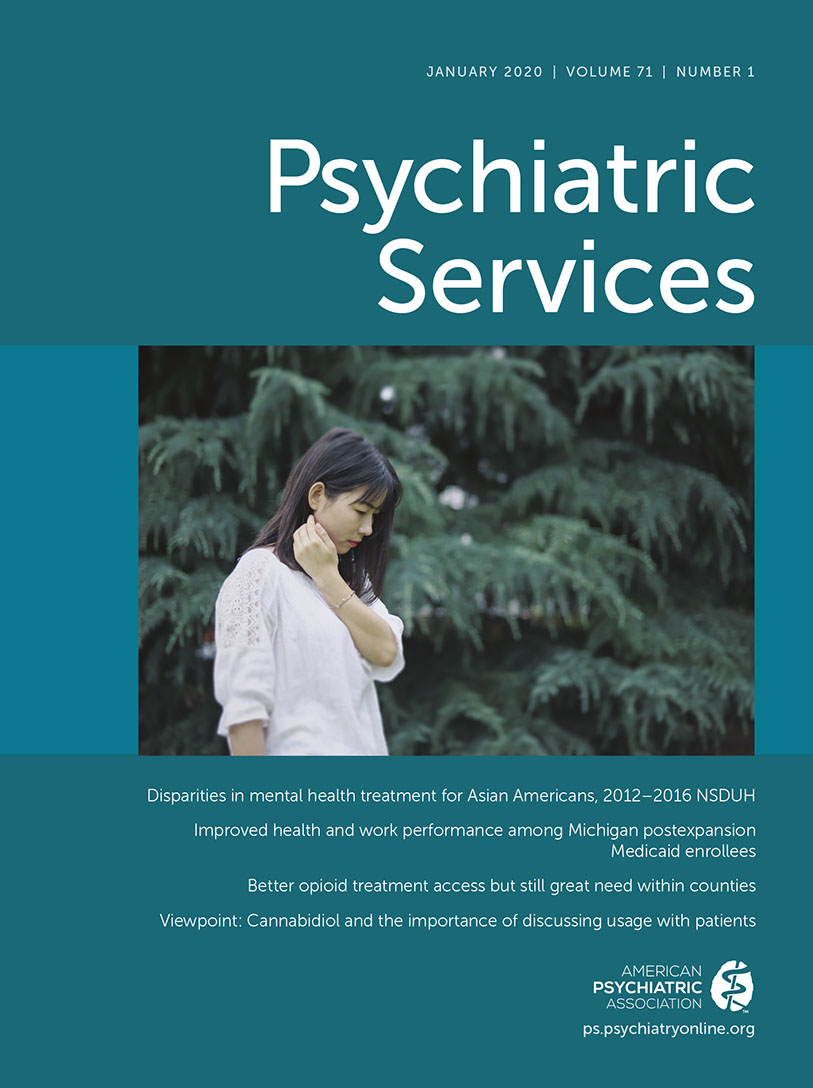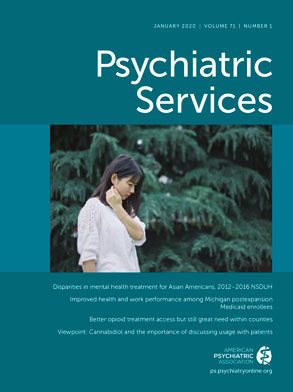Intellectual disabilities are commonly defined as significant limitations to intellectual and adaptive functioning with onset during the developmental period (
1). Although the prevalence and impact of intellectual disabilities in homeless populations have received little attention, prior research suggests that intellectual disabilities may be found in 12% to 34% of homeless persons, compared with 1% to 3% of the general population (
1–
4). People with intellectual disabilities who experience homelessness have complex support needs, spanning multiple sectors that do not traditionally work together. Although cross-sector partnerships are a promising strategy in meeting the needs of vulnerable populations, such ventures are often resource and time intensive and depend on champions and organizational flexibility and commitment (
5). This column describes the implementation of a service partnership between health care, housing, and intellectual disability organizations in Toronto. Applying a Housing First approach and philosophy, the partners launched an intervention supporting, at its first phase, 26 homeless adults with intellectual disabilities, with plans to expand across the province of Ontario pending a rigorous program evaluation. Lessons learned through this initiative are presented, including key program ingredients, the acceptability of the cross-sector intervention to service users and providers, and key enablers of partnership success.
Program Development
Compared with the general homeless population, those with intellectual disabilities report greater psychological distress and use of substances (
6) and may require ongoing support upon exiting homelessness (
1) because of enduring functional limitations. In many jurisdictions, including Canada, the complexity and fragmentation of the housing, health, and intellectual disability sectors make service navigation exceedingly difficult for this population, whose complex needs exceed the expertise and resources of most health and social service providers. Bridges to Housing (BTH)—a cross-sector partnership between local housing, health, and intellectual disability sector organizations—was initiated in 2015 to provide an integrated service approach for this underrecognized and underserved population.
The BTH intervention was developed as a 2-year demonstration project with funding support through a provincial poverty reduction strategy. In addition, each partner organization contributed all necessary infrastructure support and resources to ensure program success. Early work by members of our team (
7–
9) and clinician advocacy suggested a high prevalence of intellectual disabilities among Toronto’s homeless population. In response, the City of Toronto’s Shelter, Support, and Housing Administration and a multidisciplinary primary health care team, funded by the Ministry of Health to support the health needs of homeless shelter users, initiated a partnership focused on this vulnerable population. The City of Toronto and the primary care team had a long history of collaboration, partnership, and joint advocacy to support the needs of people experiencing homelessness. To appropriately serve people experiencing homelessness and intellectual disabilities, they jointly engaged large organizations in the intellectual disabilities sector: Community Living Toronto, a large service provision agency, and Developmental Services Ontario (DSO), the provincial administrator of publicly funded services for adults with intellectual disabilities. The initiative aimed to first identify 26 adults with intellectual disabilities among homeless shelter users and offer access to housing, primary care, and appropriate case management. Further, the initiative aimed to identify barriers in serving this population to facilitate dissemination across Ontario.
As a first step, to minimize access barriers, the partners streamlined access to timely neuropsychological assessments of homeless shelter users with a suspected intellectual disability. Whereas adults would usually wait up to 4 years for a publicly funded diagnostic assessment and access to publicly funded intellectual disability support, the primary care team enlisted their neuropsychologists, who, through a screening process prior to detailed assessments, improved access to assessment to 2 to 4 weeks. Those experiencing mild to moderate support needs were served by BTH’s cross-sector service team, inclusive of the multidisciplinary primary care team’s general practitioners, psychiatrists, registered nurses, neuropsychologists, social workers, and recreational therapists; two City of Toronto housing workers; and an adult protective services worker with expertise in case management for intellectually disabled adults. To facilitate housing access, service users received a monthly housing allowance of up to $500 (Canadian $) in addition to the Ontario Disability Support Program’s housing benefit amount. In keeping with a Housing First approach, BTH housing workers immediately sought housing opportunities of participants’ choice, including market-rent housing, while collaborating with the adult protective services worker to provide case management, personalized care and support, and access to primary and specialty health supports as needed. Those with extensive support needs were referred to other services available through the DSO.
Acceptability to Service Users
An evaluation of early program implementation, including document review and individual interviews of service users and providers, was undertaken between September 2016 and May 2017. The evaluation was completed with research ethics board oversight and approval, and all participants provided informed consent. The evaluation examined the strengths and needs of the partnership, acceptability of the cross-sector integrated service model to service users, and opportunities for program improvement. The majority of (N=14, 54%) service users were male, and the ethnoracial composition of the sample included Caucasian (N=16, 62%), black (N=6, 23%), and indigenous participants (N=4, 15%). Thematic analysis of transcripts revealed that the housing process was characterized by active participation of service users, who were empowered to communicate their housing needs and preferences, and further supported by the housing workers’ expertise and housing allowance. All BTH service users obtained housing through the intervention. Several service users formed new connections with primary and specialty health services, receiving care for a range of health issues. BTH service users remained engaged throughout the project, were comfortable discussing their needs with program staff, and generally reported positive experiences with BTH’s housing, health care, and other services.
Key Implementation Drivers
Our evaluation highlighted the following implementation drivers: capacity for complexity, choice and compromise, and collaboration and communication.
Capacity for complexity.
Because of the scarcity of research on the prevalence, support needs, and preferences of people with intellectual disabilities experiencing homelessness, service partners had little to draw from in developing the most appropriate service model. Local experience with the Housing First model suggested the need for support with rent payments, tenancy responsibilities, food security, justice system involvement, health and addiction challenges, and community integration. As a result, the service partners brought together a comprehensive cross-sector team including access to four clinicians and three social service workers. Despite the richness in resources, as many service users transitioned into housing, the need for additional support around life skills, including occupational and behavioral therapy supports, became evident.
In addition to supporting disability-specific needs, our findings exposed variable capacity among partner organizations to support individuals with substance use disorders and complex support needs. The housing and health care sectors have organizational cultures and policies supporting a comprehensive approach to substance use treatment, including a harm reduction framework where appropriate; however, the intellectual disability sector has less experience with addictions treatment, including harm reduction, because of the sector’s perception of low addiction rates among people with intellectual disabilities and a legacy of family involvement in shaping the sector’s approach to care. Service design for people with complex health conditions requires stage-matched service options, and although the partnership’s disability service providers recognized the importance of a comprehensive approach, they highlighted that addiction support needs were beyond the expertise available in many of the sector’s agencies. Likewise, many general addiction services are unprepared to meet the needs of adults with intellectual disabilities, who may have compromised language comprehension skills and require increased support for service engagement. Given the high prevalence of substance use in this population, increasing access to appropriate substance use treatment merits priority consideration.
Choice and compromise.
BTH service providers regularly discussed with service users their housing and health care options and opportunities for social participation. As part of these conversations, BTH service providers highlighted the constraints and potential consequences of these options and choices. In several instances, constraints within the local housing market required compromises on housing quality and consideration of options that were not service users’ first choice.
Furthermore, the BTH partnership aimed to support homeless individuals with intellectual disabilities and mild or moderate support needs who were able to live in the community with a moderate level of support. The model was not designed to serve those with the most complex needs, many of whom required 24/7 access to support services or high-support housing. The project screening, assessment, and referral process, however, identified many individuals with more extensive needs. Although these individuals were not served by this initiative, BTH improved their access to timely evaluation and referral to more intensive disability supports through the DSO. Supporting homeless adults with intellectual disabilities along the spectrum of support needs became a focus for advocacy and future work for partners, given the project’s inability to serve the higher need population.
Collaboration and communication.
Enhanced communication processes were critical to effective collaboration and the delivery of seamless support to service users. As in many urban settings, the local service system includes multiple sectors and organizations that do not traditionally work together. The high level of differentiation in these sectors’ functions and structures has contributed to fragmentation and navigation challenges, which the BTH partnership aimed to address. The BTH service partners included four organizations from three separate sectors, varying in understanding of each other’s strengths, challenges, and structures, including their accepted practices, language, commitments, and regulations. Consequently, the partners experienced early challenges in the development of effective communication and decision-making strategies and processes. Both frontline providers and their administrators learned that cross-sector collaboration requires substantially more frequent and detailed communications than within-sector work, and the respective organizations introduced improved communication processes, such as frequent administrative meetings and updates at every level. Additionally, a clinical manager experienced in cross-sector partnerships joined BTH to facilitate relationship building, coordinate the initiative’s administrative needs, and provide oversight to all frontline providers. Finally, to provide integrated care while adhering to the information privacy policies of the partners, the project implemented information-sharing agreements, a shared electronic health record system, and frequent joint team meetings of frontline providers.
Although challenging to implement, large cross-sector partnerships may benefit from early and formalized documentation, such as in a terms of reference agreement, to clarify roles and responsibilities among partners. Furthermore, such partnerships require comprehensive communication strategies, engaging partners as well as potential referral sources that may require information on eligibility requirements, and the strengths and limitations of the new service model.
Conclusions
Adults with intellectual disabilities are overrepresented in the homeless population yet remain largely underrecognized and underserved. To support this vulnerable population, health care, housing, and intellectual disability service organizations in Toronto initiated a new partnership serving homeless people with intellectual disabilities and mild to moderate support needs. The integrated service approach, grounded in Housing First principles, was acceptable to service users. Key enablers of success included the capacity to address complex support needs, attention to choice and compromise, and collaboration and communication of all stakeholder groups. The findings can inform related initiatives in other settings with similar challenges.

